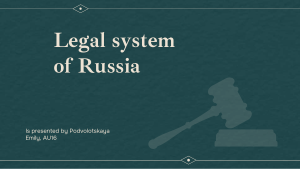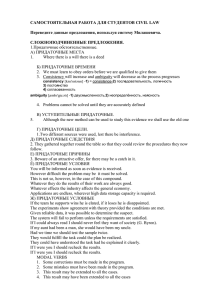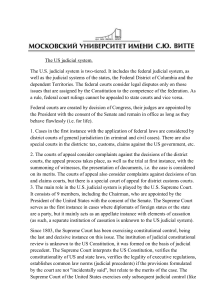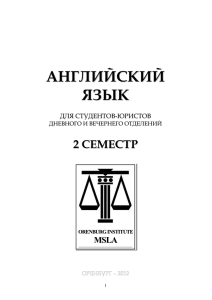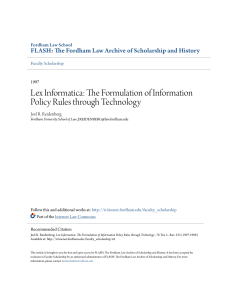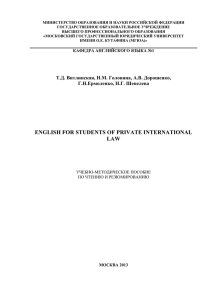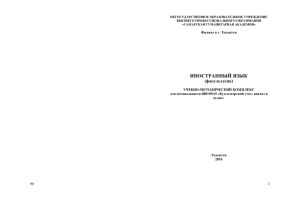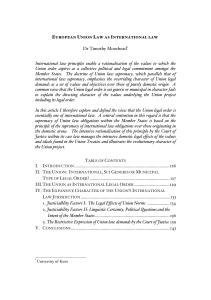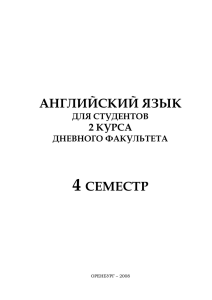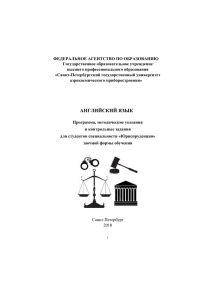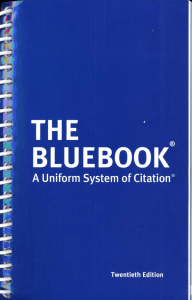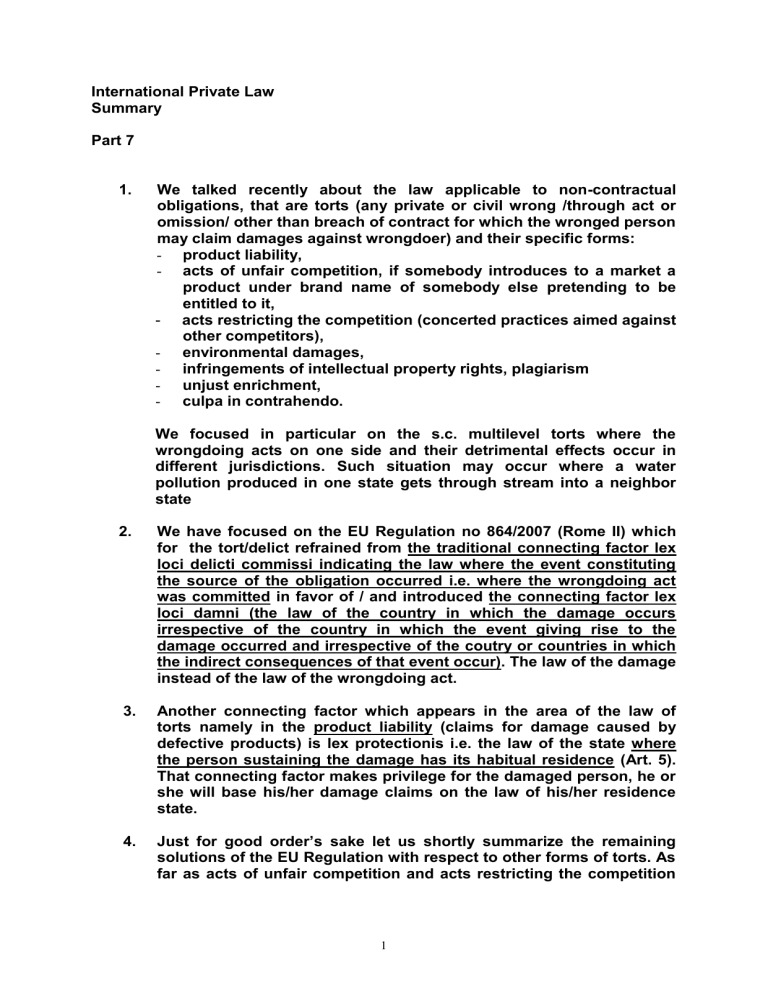
International Private Law Summary Part 7 1. We talked recently about the law applicable to non-contractual obligations, that are torts (any private or civil wrong /through act or omission/ other than breach of contract for which the wronged person may claim damages against wrongdoer) and their specific forms: - product liability, - acts of unfair competition, if somebody introduces to a market a product under brand name of somebody else pretending to be entitled to it, - acts restricting the competition (concerted practices aimed against other competitors), - environmental damages, - infringements of intellectual property rights, plagiarism - unjust enrichment, - culpa in contrahendo. We focused in particular on the s.c. multilevel torts where the wrongdoing acts on one side and their detrimental effects occur in different jurisdictions. Such situation may occur where a water pollution produced in one state gets through stream into a neighbor state 2. We have focused on the EU Regulation no 864/2007 (Rome II) which for the tort/delict refrained from the traditional connecting factor lex loci delicti commissi indicating the law where the event constituting the source of the obligation occurred i.e. where the wrongdoing act was committed in favor of / and introduced the connecting factor lex loci damni (the law of the country in which the damage occurs irrespective of the country in which the event giving rise to the damage occurred and irrespective of the coutry or countries in which the indirect consequences of that event occur). The law of the damage instead of the law of the wrongdoing act. 3. Another connecting factor which appears in the area of the law of torts namely in the product liability (claims for damage caused by defective products) is lex protectionis i.e. the law of the state where the person sustaining the damage has its habitual residence (Art. 5). That connecting factor makes privilege for the damaged person, he or she will base his/her damage claims on the law of his/her residence state. 4. Just for good order’s sake let us shortly summarize the remaining solutions of the EU Regulation with respect to other forms of torts. As far as acts of unfair competition and acts restricting the competition 1 are concerned they are governed by the law of the market was or was likely to be affected. 5. Acts of unfair competition (e.g. introducing imitated products onto the market) are governed by the law of the country where competitive relations or the collective interest are or are likely to be affected (Art. 6). It reflects the main connecting factor for torts i.e. lex loci damni. 6. The same refers to acts restricting the competition (e.g. concerted practices of certain competitors aimed against other competitors in the same market) are governed by the law of the country where the market is, or is likely to be, affected (Art. 6 sec. 3a). When the market is, or is likely to be, affected in more than one country, the person seeking compensation for damage who sued in the court of the domicile of the defendant, may instead choose to base his or her claim on the law of the court seized, provided that the market in Member State is amongst those directly or substantially affected by the restriction of competition out of which the non-contractual obligation on which the claim is based arises. 7. As far as non-contractual obligations arising out of environmental damage or damage sustained by person or property as a result of such damage, constituting the manifest example of a potential multilevel tort, shall be the law determined pursuant to Art. 4(1) unless the person seeking compensation chooses to base his or her claim on the law of the country in which the event giving rise to the damage occurred (Art. 7). Here we come back to the main connecting factor of lex loci damni while in some circumstances lex loci delicti prevails. 8. If a non-contractual obligation arising out of unjust enrichment, including payment of amounts wrongly received, concerns a relationship existing between the parties such as one arising out of contract or a tort/delict that is closely connected with that unjust enrichment, it shall be governed by the law that governs that relationship (Art. 10). 9. Finally the law applicable to a non contractual obligation arising out of dealings prior to the conclusion of a contract, regardless of whether the contract was actually concluded or not (culpa in contrahendo), shall be the law that applies to the contract or that would have been applicable to it had it been entered into (Art. 12 sec. 1). 10. The EU Regulation is flexible insofar that the law applicable established following the above rules should in certain circumstances be replaced by another law, namely 1) if the person claimed to be liable and the person sustaining damage both have their habitual residence in the same country at the time when the damage occurs, the law of that country shall apply. Moreover: 2) where it is clear from all the circumstances of the case that the tort/delict is manifestly more closely connected with a country other that indicated in the 2 aforementioned paragraphs the law of that country shall apply. A manifestly closer connection which prevails with respect to the establishing of the law applicable might be based in particular on preexisting relationship between the parties such as a contract that is closely connected with the tort/delict in question. 11. Although the specifics of non-contractual obligations is that the legal link between the parties i.e. the wrongdoer and the person damaged starts to exist at the moment when the damage occurs, the parties autonomy in establishing the law applicable – as it was natural in the area of contracts – may also take place. The EU Regulation allows for the choice of law in Art. 14 which provides for as follows: Freedom of choice: The parties may agree to submit non-contractual obligation to the law of their choice 1) by an agreement entered into after the event giving rise to the damage occurred or 2) where all the parties are pursuing a commercial activity also by an agreement freely negotiated before the event giving rise to the damage occurred (e.g. business companies or other business entities remaining in business relations enter into an arrangement that all their relations including torts and claims arising out thereof will be governed by the law of state X). The choice shall be expressed or demonstrated with reasonable certainty by the circumstances of the case and not prejudice the rights of third parties. 12. Restrictions of the choice: Where all elements relevant to the situation at the time of when the event giving rise to the damage occurs are located in a country other than the country whose law has been chosen the choice of the parties shall not prejudice the application of the law of that other country which cannot be derogated from by agreement. 13. The law applicable to claims arising out from acts of unfair competition, acts restricting free competition and infringements of intellectual property rights may not be derogated from by an agreement on choice of law. 14. Now we finish findings or ways of establishing laws applicable to contracts and non-contractual obligations. We proceed to jurisdiction matters. The term “jurisdiction” means the authority to interpret and apply the law. Therefore the jurisdiction is the domain of the courts and as such constitutes the issue of the procedural law. The question “who has jurisdiction” can be expressed otherwise by the question “which court is competent to hear and determine the case” or – more precisely – the court of which country is competent thereto. That question has to be differentiated from the law applicability although both issues remain in close relation. Actually the jurisdiction issue must be fixed first and – after having been determined – we can solve the problem of the law applicable. The court, which has jurisdiction, based on its own conflict of law rules (international private law) establishes the law applicable to the case in question. 3 15. Each and every country determines itself the jurisdiction of their state courts and also special courts, the jurisdiction of which depends on the will of the parties involved. I mean the s.c. arbitration tribunals the jurisdiction of which is based on the arbitration clause made by the parties of the contract (of the dispute, if it arose). The general principle, acknowledged (accepted) by all legal systems, including Polish law, is that the courts of the respective state have jurisdiction insofar the defendant has its domicile (seat) in that country. 16. The aforementioned principle has been also accepted by the Council Regulation (EC) No. 44/2001 of December 22, 2000 on jurisdiction and the recognition and enforcement of judgements in civil and commercial matters, which in Art. 2 provides for that persons domiciled in Member States shall, whatever their nationality, be sued in the courts of that Member State. If the residents shall be sued in the courts of their residence states then those courts have jurisdiction over them as defendants and consequently over disputes, in which they were sued. 4
